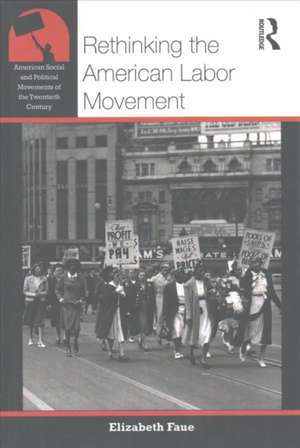Rethinking the American Labor Movement: American Social and Political Movements of the 20th Century
Autor Elizabeth Faueen Limba Engleză Paperback – 3 mai 2017
| Toate formatele și edițiile | Preț | Express |
|---|---|---|
| Paperback (1) | 318.44 lei 6-8 săpt. | |
| Taylor & Francis – 3 mai 2017 | 318.44 lei 6-8 săpt. | |
| Hardback (1) | 1001.07 lei 6-8 săpt. | |
| Taylor & Francis – 3 mai 2017 | 1001.07 lei 6-8 săpt. |
Din seria American Social and Political Movements of the 20th Century
-
 Preț: 273.41 lei
Preț: 273.41 lei -
 Preț: 296.35 lei
Preț: 296.35 lei -
 Preț: 309.89 lei
Preț: 309.89 lei -
 Preț: 409.69 lei
Preț: 409.69 lei -
 Preț: 277.11 lei
Preț: 277.11 lei -
 Preț: 408.54 lei
Preț: 408.54 lei - 17%
 Preț: 256.76 lei
Preț: 256.76 lei -
 Preț: 341.20 lei
Preț: 341.20 lei -
 Preț: 342.13 lei
Preț: 342.13 lei -
 Preț: 368.03 lei
Preț: 368.03 lei -
 Preț: 334.99 lei
Preț: 334.99 lei -
 Preț: 347.52 lei
Preț: 347.52 lei -
 Preț: 320.36 lei
Preț: 320.36 lei -
 Preț: 347.62 lei
Preț: 347.62 lei
Preț: 318.44 lei
Nou
Puncte Express: 478
Preț estimativ în valută:
60.94€ • 63.39$ • 50.31£
60.94€ • 63.39$ • 50.31£
Carte tipărită la comandă
Livrare economică 14-28 aprilie
Preluare comenzi: 021 569.72.76
Specificații
ISBN-13: 9780415895842
ISBN-10: 0415895847
Pagini: 246
Dimensiuni: 152 x 229 x 21 mm
Greutate: 0.34 kg
Ediția:1
Editura: Taylor & Francis
Colecția Routledge
Seria American Social and Political Movements of the 20th Century
Locul publicării:Oxford, United Kingdom
ISBN-10: 0415895847
Pagini: 246
Dimensiuni: 152 x 229 x 21 mm
Greutate: 0.34 kg
Ediția:1
Editura: Taylor & Francis
Colecția Routledge
Seria American Social and Political Movements of the 20th Century
Locul publicării:Oxford, United Kingdom
Public țintă
UndergraduateCuprins
Introduction: The Labor Movement as a Social Movement
Chapter 1: Origins: Insurgent Labor, 1905-1922
Chapter 2: Rebuilding the Movement, 1922-1945
Chapter 3: Stability and Retreat: Labor's 'Men of Power', the Cold War, and the State
Chapter 4: Lost Opportunities: Labor, the New SOcial Movements, and Economic Change
Chapter 5: Labor's Strengths and Weaknesses
Chapter 6: The Fate and Legacy of Labor in American Politics
Chapter 1: Origins: Insurgent Labor, 1905-1922
Chapter 2: Rebuilding the Movement, 1922-1945
Chapter 3: Stability and Retreat: Labor's 'Men of Power', the Cold War, and the State
Chapter 4: Lost Opportunities: Labor, the New SOcial Movements, and Economic Change
Chapter 5: Labor's Strengths and Weaknesses
Chapter 6: The Fate and Legacy of Labor in American Politics
Recenzii
Drawing upon a century of innovative scholarship, Elizabeth Faue provides a new synthesis of the U.S. working class. This incisive history not only reveals how a variety of neglected constituents challenged the narrow white supremacist, sexist, trade unionist, and private sector construction of the working class, but also gradually broadened the base of the labor movement itself. While a variety of global, national, and local forces, including labor’s own legacy of blindspots and missed opportunities, stymied the growth of a more diverse and inclusive labor movement by the late 20th century, Faue nonetheless sees hope for the "rebirth" of the labor movement in the recent Fightfor$15, the Occupy Movement, LBGT Rights, and the Black Lives Matter Movement.
- Joe William Trotter, Jr., Giant Eagle Professor of History and Social Justice and Director, Center for Africanamerican Urban Studies and the Economy (CAUSE) at Carnegie Mellon University
"In this stunning synthesis, Faue explores the success, and ultimate failure of the twentieth century U.S. labor movement to acquire continuing political power and economic clout. She tells us how, in the face of, depression and war, unions struggled with issues of race, gender, class; and overcame internal divisions to narrow the equality gap. But she also pinpoints the global trends that led to corporate and government hostility at the end of the century. Hers is an optimistic projection: through new coalitions and grassroots political innovation, Faue suggests, the labor movement continues to offer a hopeful path to a democratic future."
Alice Kessler-Harris, author of Gendering Labor History
- Joe William Trotter, Jr., Giant Eagle Professor of History and Social Justice and Director, Center for Africanamerican Urban Studies and the Economy (CAUSE) at Carnegie Mellon University
"In this stunning synthesis, Faue explores the success, and ultimate failure of the twentieth century U.S. labor movement to acquire continuing political power and economic clout. She tells us how, in the face of, depression and war, unions struggled with issues of race, gender, class; and overcame internal divisions to narrow the equality gap. But she also pinpoints the global trends that led to corporate and government hostility at the end of the century. Hers is an optimistic projection: through new coalitions and grassroots political innovation, Faue suggests, the labor movement continues to offer a hopeful path to a democratic future."
Alice Kessler-Harris, author of Gendering Labor History
Descriere
Rethinking the American Labor Movement tells the story of the various groups and incidents that make up what we think of as the 'labor movement,' and shows that these efforts are political in nature and form a social movement that has shaped the trajectory of American life.
















